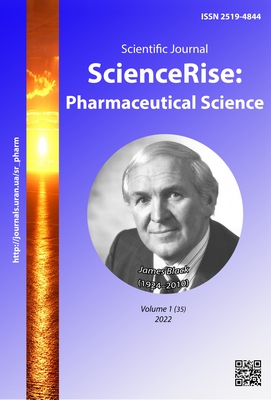Setting the equation of regression to determine the technological factors influence on the content of flavonoids in the extract
DOI:
https://doi.org/10.15587/2519-4852.2022.253547Keywords:
experimental data processing, quantitative factors, multiple regression, identification, geometric mean functionAbstract
The aim of the article is to establish a regression equation that determines the influence of technological factors on the content of flavonoids in the extract for further use in optimizing the technology for obtaining an extract based on horse chestnut. The task of the research was to identify a mathematical model to describe the effect of technological parameters of extraction on the target quality indicators of a given dosage form, in particular, on the quantitative content of flavonoids.
Materials and methods. The proposed approach is based on mathematical processing of experimental results obtained according to plan 23 using the computer program Mathcad 14 and MS Excel. To establish a mathematical description, an analysis of the separate influence of technological factors on the target indicator was carried out and the possibility of forming a geometric mean function was determined using the corresponding linear regression equations.
Results. The general problem of identification was solved, when it was necessary to reveal both the mechanism of influence of technological factors on the value of the target indicator, and to give a quantitative assessment of the unknown parameters of the regression equation. Based on the results of experimental observations, an adequate mathematical model was established in the form of a linear multiple regression equation with the interaction of factors.
Conclusions. The obtained mathematical description makes it possible to analyze the influence of technological factors on the quantitative content of the complex of flavonoids in the herbal extract in the range of the investigated factor space, and also to optimize the technological parameters of extraction
References
- Kenny, H. A., Hart, P. C., Kordylewicz, K., Lal, M., Shen, M., Kara, B. et.al. (2021). The Natural Product β-Escin Targets Cancer and Stromal Cells of the Tumor Microenvironment to Inhibit Ovarian Cancer Metastasis. Cancers, 13 (16), 3931. doi: http://doi.org/10.3390/cancers13163931
- Orhurhu, V., Chu, R., Xie, K., Kamanyi, G. N., Salisu, B., Salisu-Orhurhu, M. et. al. (2021). Management of Lower Extremity Pain from Chronic Venous Insufficiency: A Comprehensive Review. Cardiology and Therapy, 10 (1), 111–140. doi: http://doi.org/10.1007/s40119-021-00213-x
- Waltenberger, B., Mocan, A., Šmejkal, K., Heiss, E., Atanasov, A. (2016). Natural Products to Counteract the Epidemic of Cardiovascular and Metabolic Disorders. Molecules, 21 (6), 807. doi: https://doi.org/10.3390/molecules21060807
- Smyth, R. M., Aflaifel, N., Bamigboye, A. A. (2015). Interventions for varicose veins and leg oedema in pregnancy. Cochrane Database of Systematic Reviews. doi: http://doi.org/10.1002/14651858.cd001066.pub3
- Yamuna, M., Elakkiya, A. (2017). Mathematical Models in Drug Discovery, Development and Treatment of Various Diseases-A Case Study. Research Journal of Pharmacy and Technology, 10 (12), 4397–4401. doi: https://doi.org/10.5958/0974-360x.2017.00810.1
- Fytopoulos, A., Ramachandran, R., Pardalos, P. M. (Eds.) (2022). Optimization of Pharmaceutical Processes. Springer International Publishing, VII, 435.
- Rothlauf, F. (2011). Optimization Methods. Design of Modern Heuristics, 45–102. doi: http://doi.org/10.1007/978-3-540-72962-4_3
- Stute, W., Thies, S., Zhu, L.-X. (1998). Model checks for regression: an innovation process approach. The Annals of Statistics, 26 (5), 1916–1934. doi: https://doi.org/10.1214/aos/1024691363
- Hroshovyi, T. A., Martseniuk, V. P., Kucherenko, L. Y., Vronska, L. V., Hyrieieva, S. M. (2008). Matematychne planuvannia eksperymentu pry provedenyy naukovykh doslidzhen v farmatsii. Ternopil: Ukrmedknyha, 377.
- Draguljic D., Dean A., Voss D. Design and Analysis of Experiments. 2-е ed. Springer International Publishing AG, 2017. 840 р. doi.org/10.1007/978-3-319-52250-0
- Dean, A., Voss, D., Draguljić, D. (2017). Design and Analysis of Experiments. Springer Texts in Statistics, 840. doi: http://doi.org/10.1007/978-3-319-52250-0
- Cherneva, K., Furrer, R., Tarigan, B. (2021). SampleSizeR: calculate sample sizes within completely randomized design. Available at: http://shiny.math.uzh.ch/git/reinhard.furrer/SampleSizeR/
- Lawson, J. (2018). Design and Analysis of Experiments with R. CRC Press. Chapman and Hall/CRC, 620.
- Lazic, S. E. (2016). Experimental Design for Laboratorist Biologists. 1-е ed. Cambridge University Press, 412.
- Ferreira, A. P., Tobyn, M. (2014). Multivariate analysis in the pharmaceutical industry: enabling process understanding and improvement in the PAT and QbD era. Pharmaceutical Development and Technology, 20(5), 513–527. doi: https://doi.org/10.3109/10837450.2014.898656
- Alexopoulos, E. C. (2010). Introduction to Multivariate Regression Analysis, 14 (Suppl 1), 23–28.
- Zhuravskii, A. A., Zelenskii, A. I., Sinyaeva, A. V., Kutovaya, O. V. (2018). Novyi metod statisticheskoi obrabotki rezul'tatov nauchnyh issledovanii. Naukovo-praktychni zasady zaghaljno-inzhenernoji pidghotovky fakhivciv farmaciji: materialy I Mizhnar. nauk.-prakt. internet-konf. Kharkiv: NPhU, 96–101.
- Ruban, Е. A, Kutsenko, S. A., Kovalevskaya, I. V., Kutova, O. V. (2014). Optimizatsiya parametrov ekstragirovaniya lekarstvennogo rastitel'nogo syr'ya dlya polucheniya slozhnoy nastoyki «Venoton». Vestnik farmatsii. Belorussiya, 2, 37–41.
- Brent, M. (2009). Essential Mathcad for engineering, science, and math ISE. 2nd ed. Amsterdam: Elsevier; Burlington, MA: Academic Press, 501.
- Carter Hill, R., Genevieve, B. (2018). Using Excel for Principles of Econometrics, 5th Ed.
- Kutovaya, O., Kovalevska, I., Sahaidak-Nikitiuk, R. (2021). Determination of regression equations based on the generalized separate influence of factors in pharmaceutical research. Norwegian Journal of development of the International Science, 57 (1), 39–43.
Downloads
Published
How to Cite
Issue
Section
License
Copyright (c) 2022 Olga Kutova, Rita Sahaidak-Nikitiuk, Inna Kovalevska, Nataliya Demchenko

This work is licensed under a Creative Commons Attribution 4.0 International License.
Our journal abides by the Creative Commons CC BY copyright rights and permissions for open access journals.







